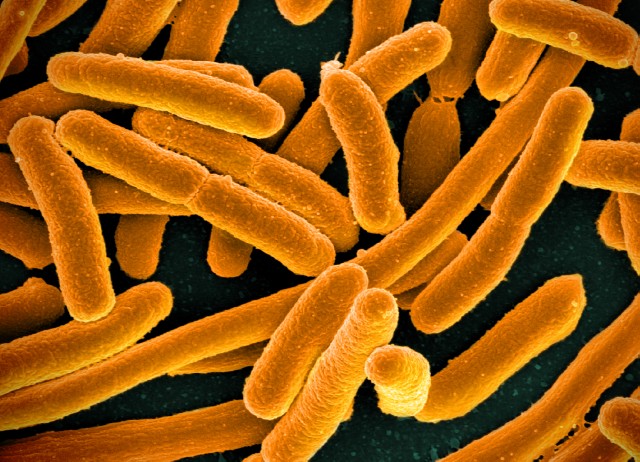Gulp. These Volunteers Are Swallowing E. Coli Pills to Help Medicine

Somewhere in Baltimore, volunteers are gulping capsules filled with GMOs—gene-modified E. coli bacteria, to be precise.
Synlogic of Cambridge, Massachusetts, the company behind the unusual study, is testing what it calls “synthetic biotics,” or bacteria engineered to carry out specialized jobs in a person’s stomach.
Inside the pills are E. coli engineered to sop up ammonia inside the gut of people who can’t get rid of it fast enough. The study signals how genetic engineers are hoping to harness the microbiome, as the trillions of microscopic organisms that dwell within you are known.
The drug is designed to help people suffering from disorders of the “urea cycle.” That’s the metabolic flywheel inside your liver that gets rid of excess nitrogen. For people whose urea cycles are faulty, excess nitrogen turns into ammonia, just like what’s under your kitchen sink, and just as hazardous.
Though the condition is rare, for some people it’s serious enough to require a liver transplant.
This study, which began in June, doesn’t yet involve any sick patients. Instead, it’s a safety trial. The volunteers taking the drug collect a fee for swallowing GM germs to advance knowledge. They have to live in a testing facility for as long as three weeks so technicians can monitor them and collect their poop for DNA analysis.
Of the 50 people the trial is meant to study, Synlogic CEO J.C. Gutierrez-Ramos says “many” have already taken the new GMO pill. Others, picked at random, have gotten a placebo. The trial is being carried out at one hospital in Maryland.
The drug represents a concrete application of synthetic biology, which is the idea of engineering an organism’s metabolism to produce fuel, drugs, perfumes, or other chemicals. Previously, a company called ActoGenix undertook studies in Europe of a GM version of the bacterium Lactococcus lactis that it had altered so it released a protein drug. In the U.S., Marina Biotech also carried out a small safety test of anti-cancer bacteria, also genetically modified.
The U.S. Food and Drug Administration, which considers such drugs to be “live biological products,” this summer fast-tracked Synlogic’s application to try it on people. Gutierrez-Ramos says Synlogic will know if it’s safe by December and hopes to start up studies in actual patients next year.
Keep Reading
Most Popular
Large language models can do jaw-dropping things. But nobody knows exactly why.
And that's a problem. Figuring it out is one of the biggest scientific puzzles of our time and a crucial step towards controlling more powerful future models.
How scientists traced a mysterious covid case back to six toilets
When wastewater surveillance turns into a hunt for a single infected individual, the ethics get tricky.
The problem with plug-in hybrids? Their drivers.
Plug-in hybrids are often sold as a transition to EVs, but new data from Europe shows we’re still underestimating the emissions they produce.
Google DeepMind’s new generative model makes Super Mario–like games from scratch
Genie learns how to control games by watching hours and hours of video. It could help train next-gen robots too.
Stay connected
Get the latest updates from
MIT Technology Review
Discover special offers, top stories, upcoming events, and more.